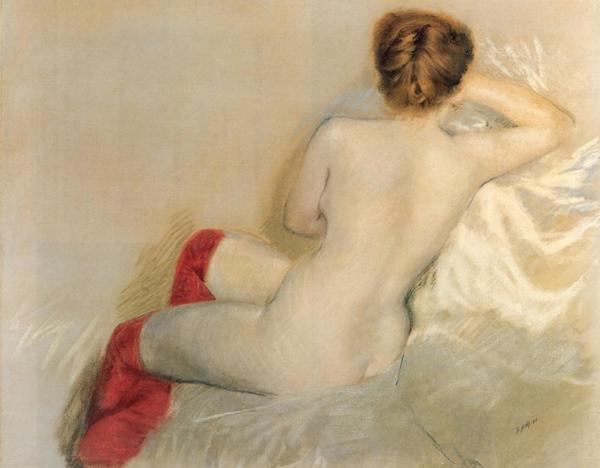Valentine's Day 2010 & Beyond: Exploring Musk Oils - Part 2 {Scented Thoughts} {Perfume List}
I hope that you had a lovely Valentine's Day and that you celebrated in high or low style. A rose, a glass of wine, sweet words will do, at every opportune occasion -- or when you're not running after time.
As promised, albeit belatedly, I am now turning again to those straight-up musk oils that I started talking about last week or so. What I have learned in-between is that there are many more brands that I would need to reference to produce a comprehensive little guide to musk oils that this series of articles is going to be, hopefully. They are a little daunting, these oils, due to their proliferation.
Why am I fascinated by musk oils? For one thing they are very much pop-culture and I adore pop culture. I think it is also because in their very mushrooming and ubiquitous existence they seem to express such universal hope that something unique is going to take place between a mysterious musk cocktail and your own skin-and-personality chemistry.
I think the descriptive musk-cocktail is particularly appropriate in light of the fact that different musky synthetic molecules are routinely mixed and shaken to overcome the rather largely occurring problem of musk anosmia: the incapacity to smell a particular musk. Even perfumers are not immune to the issue and according to Richard L. Dorty "...an informal poll among perfumers, for example, has elicited the fact that most of them are completely anosmic to one or more musks..." Galaxolide, the laundry-detergent musk of choice, is a prime candidate in this regard. [Richard L. Dorty, 2003]. Next to anosmia, there is the lesser evil of parosmia which allows you to perceive a scent, but feebly...
Looking for the perfect aromatic composition is the hope contained in all perfume bottles, but with musk oils the proposition is laid bare, exposed to the sun and simplified to the extreme. The result? People form incredible attachments to their favorite musk oils ( and perfumes.) When those scents are changed or discontinued you can hear a long moan of pain reverberating in the forums and blog threads. Like in this case regarding R.H. Cosmetics Mystic Musk,
"I am from Puerto Rico and I belong to the muskmania group of the 70s. I don't give up in my search. I ordered it from Cooper Labs but I did not smell anything that was like R.H. MYSTIC MUSK OIL. However, in the meantime (I still hope someone could help us find the nearest fragance and lasting musk) I use Jovan Musk from Walgreens ($13.95). Or Bettina Musk also from Walgreens. The enchanting, mysterious, haunting, lovely, sexy, exotic, unique, heavenly, adorable, and all the atributes that can describe this R.H. MYSTIC MUSK still arouses our senses, just by pronouncing the word M U S K..... Good Luck in your search and please share
Your findings....our treasure....MUSK. BLESSINGS TO ALL.
Your musky friend, AGNES..." [100perfumes.com, 2007]
The oil that carries the scent is here to remind us that this particular perfume is meant to cling to and meld with your the skin. Indeed it is so much an attribute of the genre that perfumes later on would take the name "musk oil" in a metaphorical manner even when alcohol-based, like Royal Copenhagen Musk Oil.
Musk oils and Musk-oil scents hold a promise of intimacy, not just of sexual overture as might be initially thought of. If perfume is a form of language and says something about society, it means that the popularity of musk oils points to the importance we attach to a sense of intimacy, corporeal well-being, and sensuality not just for others but for ourselves. To inhale musk is to smell our own body scent in an enhanced manner. For seducing others only, there are perfumes with sillages that sometimes smell better and more clearly defined to others than to yourself. So when choosing perfume, you can ask yourself for whom you want to smell? 1) mostly for yourself 2) you and others 3) others mostly. Musk oils are for you and others.
As I wrote in my previous post, musks were symptomatic of the period of the 1970s and what came to be characterized as the era of sexual liberation. One may wonder whether musk oils would have been so widely disseminated without the invention of the birth control pill in the 1960s.
We know that in the United States there was the early musk oil made by Kiehl's during the 1920s, the grand old age of Jazz Age but which was stored away in a basement and commercialized... only forty years later in the 60s. The scent initially called Love was reportedly made by a Russian prince. There are often enigmatic Russian princes and princesses involved in perfume creation stories, mind you.
Before that, the advice literature of the beginning of the 20th century generally frowned upon musk "odors" as unbecoming to a gentle lady. Society-matron-turned-journalist Harriett Hubbard Ayer characterized musk as the scent of the parvenu just like to her nose patchouli was. Before her, Eugene Rimmel had extended a similar concept and precept: a lady was to wear an "ethereal" perfume and eschew the coarseness of musk.
Going back to the 1920s, closer to the date of birth of Kiehl's Musk, "musk" is presented in Scott F. Fitzgerald's prose as a sign of weakness, laziness and association with the devil in The Curious Case of Benjamin Button. In O Russet Witch! musk becomes a tool of mercantile manipulation where "musk" is used to create the special atmosphere of the Moonlight Quill Bookshop described as being radical, dark and displaying heavily censored books. The author does not seem to indicate that the scent "musk" literally smells of animal musk but that it has that same kind of persistence, heaviness and effect. Since Fitzgerald was well-attuned to what took place in the new emerging mores of his times, we can see through him how the musk notion was both still morally ambivalent yet found to be newly practical and desirable in a public space which is not that of the very specific confines of the bordello anymore but that of a marginal bookstore frequented by types in dire need of a more satisfying existence: bored old ladies and young men with dark circles under their eyes.
Strong aromas were seen in the Victorian age as having an impact forceful enough to threaten social boundaries and identities. At a time when sartorial signs were cultivated to convey social status and class, perfume was ideally seen as helpful at conveying the same kind of clarity. It was especially reassuring to see women wear those signs that differentiated the demi-mondaine from the bourgeoise and the lady. As the boundaries blurred and perfectly respectable women became more and more influenced by beauty standards upheld by actresses and the grandes horizontales, i.e. diverse constituencies of professional, showy beauties, men complained that those two neatly divided worlds at one time had become so close, it was virtually impossible to distinguish them apart.
Retrospectively, it is funny to see that in the 1970s it was precisely those two aromas, musk and patchouli, deemed at one point to be vulgar enough for the nouveau-riche and red-light district sorts that became iconic of a more liberated period. It is one more indication that the 70s were still a reaction against the Victorian morality which prevailed a century earlier.
Today, musks have entered an era of eclectism and polite compromise: you can smell both musky and pure as untainted snow thanks to this modern invention, the white musk (here also), a musk associated with the culture of cleanliness and youth (and consideration for your neighbor's sensitivities.) It is not that easy to find a dirrrty musk oil nowadays and if they are to be located anywhere, it is in the libraries of connoisseurs (try CB I Hate Musk; Serge Lutens Muscs Koublaï Khan (an edp))
Abdul Kareem Egyptian Musk
This scent has been associated with Carolyn Bessett Kennedy who famously wore Egyptian Musk as her signature perfume. Since she was living in New York City, people thought this might be her brand of choice. It is a particularly low-key and subtle Egyptian Musk befitting the late Carolyn Bessett Kennedy's East Coast patrician style. Probably the most understated of the ones I have smelled so far. For those who seek a maximum of discretion. It's not for people who have trouble smelling musk, unless they tend to over apply. the oil tends to stay on the surface of the skin.
Body Time Egyptian Musk
The consistency of this oil is particularly thick and even a bit gooey but it sinks very well into the skin. It has subtle nuances of fruits and vanilla that other Egyptian musk oils do not have. This oil is visibly inspired by Dolce and Gabbanna Light Blue. Surprisingly sexy with a hint of dessert and spicy sandalwood.
Auric Blends Egyptian Goddess
It is the bestseller of the brand. This is a soft musk oil, but less soft than Abdul Kareem. It has subtle nuances of leather, cow-hide and dry cedar that other oils do not have. It is therefore a bit dirtier and animalic but very discreetly so. Those notes make it a good candidate as a musk oil for men despite its name unless it means: worship the goddess instead of being one. Very good diffusive power if you want a little aura and sillage effect.
Narciso Rodriguez Eau de Toilette for Her
This perfume is inspired by the musk-oil concept. Incidentally, Carolyn Bessett Kennedy was a friend of Narciso Rodriguez. It's a woody fruity-floral Egyptian musk with solar, beach-y nuances. There is an actual oil in this range but which I have not smelled (yet). It's deliciously floral, jasmine-y and woodsy.
Cabot the Original Natural Musk Oil
This one is as white and airy a musk as can be. The scent is transparent, smells of freshly ironed shirt, but not of soap, and should please partisans of clean, glass-like musks. The oil sinks well in the skin.
More musk oil reviews to follow.









